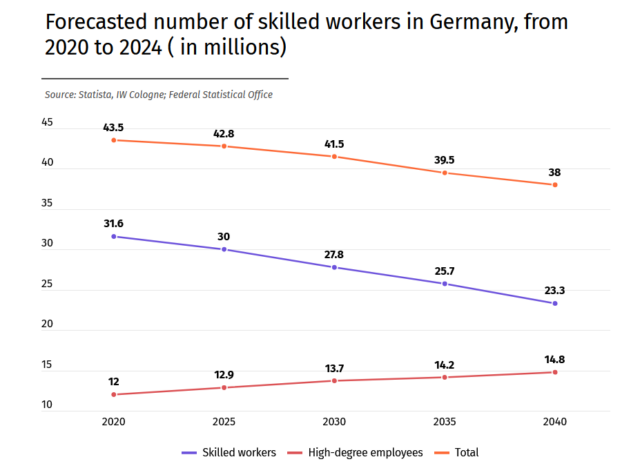
Unemployment? In fact, there is no longer much to fear throughout Central Europe, according to a new study by Stocklytics.com. Especially if you have some education, a job seems almost guaranteed in the coming years. In the largest economy in Europe, Germany, the shortage of skilled workers has even ‘reached a critical level,’ according to the researchers. ‘And the scale of this problem will only increase in the future.’
According to the research data, the number of skilled workers in Germany is expected to fall to 23.3 million by 2040, about a quarter less than the current number. No wonder the German Economic Institute expects the shortage of skilled workers to significantly impact the industry in the region over the next 15 years. By 2025, all of Central Europe will face a tight labour market, say the researchers, with the number of vacancies increasing and unemployment falling to a historic low.
Economists have calculated that economic growth this year would be more than 1% higher if there were enough workers.
According to a recent study by the German Economic Institute, the neighbouring country already has a shortage of about 573,000 skilled workers. Economists have calculated that economic growth this year would be more than 1% (or 49 billion euros) higher if there were enough workers. That is significant, especially considering that economic forecasts for 2024 predict growth of just 0.2%.
Decline and Aging
According to the researchers, the ageing population, low birth rates, and increasing demand for highly skilled professionals collectively ensure that the labour shortage is now the second-largest business risk for German companies. By 2035, the German labour market is expected to have a shortage of another 4.3 million skilled workers, reducing their total number to 25.7 million. In 2040, the total German workforce will decline by 5.5 million people despite an increase in highly educated workers.
‘On the old continent, by 2040 more than a quarter of the population will have reached retirement age.’
‘The old continent faces a future whereby 2040 more than a quarter of the population will have reached retirement age,’ the researchers say. At the same time, they note that education and training systems have hardly focused on the skills needed to replace retiring workers or meet the demand for labour in growing industries, such as ICT and artificial intelligence. ‘Solving these problems is essential to securing Europe’s competitiveness,’ they conclude, somewhat redundantly.
Contributing to a Solution?
Interested in contributing to a solution in the German labour market? In September, ToTalent is organizing the first Webinar Tage in history for recruitment parties interested in the DACH region. The webinars will be free for the target audience to view. Click on the link for more information:
Partner Brochure









